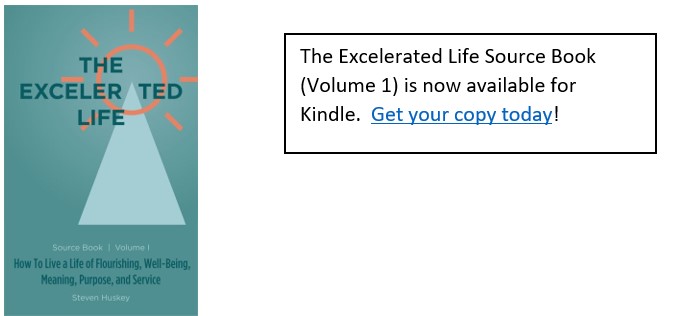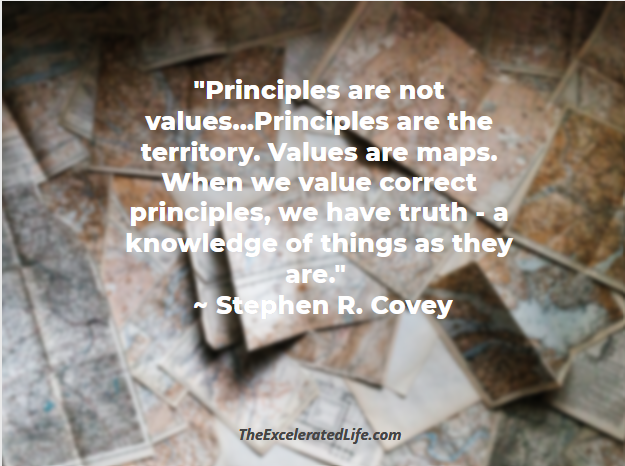We all have values whether we’ve identified them or not. It is to our benefit to know what our values are and to live in accordance with them. When values conflict, make the choice that keeps you on track with the actions and behaviors that keep you true to yourself and to the important people around you.
Title Photo by Karolina Grabowska
A Story About {Conflicting} Values
Once upon a time, there lived a man named Thomas. Thomas was working with a coach to set some BIG goals for his life. One of the first steps Thomas’ coach had him do was to identify his core values. Thomas listed values in three areas of his life – work, family, and personal.
For work, Thomas chose these values: success, economic security, responsible, and productive. Thomas then listed these family values: nurturing, stability, caring, and family well-being. Finally, he selected these personal values: spirituality, good health, free time, and service.
But soon Thomas ran into a difficult decision concerning which of these values he would honor. He was asked to work over the weekend on a special project, a high-profile endeavor that could be a huge boost to his career. Unfortunately, he had also discussed taking his family on an outing to an amusement park this upcoming Saturday. Then he was asked by some good friends to join their foursome for a golf tournament.
Now Thomas was faced with a choice. What will he do?
When Values Conflict
We all face these decisions from time to time if we’ve taken the time to clarify our own values. Mostly, they are small, everyday choices that don’t appear to have much consequence. “But over time, they can play out far more dramatically.” [Christensen]
Conflicting values crop up in our lives frequently. I recall a speaker many years ago who gave this example. “I want to live simply so that others may simply live AND I want the temperature in my swimming pool to be 84 degrees.”
Or one I run up against almost weekly: “I want to approach a zero-waste life AND I want the convenience of pre-packaged salad greens and hard-boiled eggs in packages that can’t be recycled.”
Like Thomas, we will face decisions based on conflicting values. What will we do?

When Values Conflict At Work
At work, there are a number of conflicts that can come up. Your boss’s values may be different from your values. Perhaps your boss wants you to work late on a day you have arranged a date night with your spouse.
There could be disagreements between your company’s values and your values. The company may limit the sharing of certain information while you have a customer that would benefit from an open discussion around a problem they have with your product.
Finally, there will be divergence at times between your own work values vs. family and personal values, exactly what our friend Thomas ran into when he had to choose between working on a weekend or going on an outing with his family.
When Values Conflict At Home
Sometimes, your family values may be different from others’. You value a quiet evening at home to rest and recharge and your spouse needs to entertain guests and interact with others.
Or your values may be at odds with what you see as societal and cultural values. You want to cut back on spending and save more money, yet you are bombarded daily by advertisements urging you to spend, spend, spend; to “go for the gusto” and to “grab life by the horns”!
Then, of course, there is the occasional disagreement between family values vs. work and personal values. Go on the outing or take on that prestigious project at work?
When Personal Values Conflict
There can often be times when your personal values conflict with others. Your values are sometimes different from your friends’ values. When do you compromise and when do you stick to your guns?
And just as your home and family values can be different from the values embraced by our society and culture, so can your personal values be at odds with these.
But also, your different values, be they personal, family, or work, may be in conflict among themselves.
Determine Your Values
So, how can we begin to face up to and address these conflicting values?
Well, to live by your values, you have to know what they are. So the first step – if you haven’t done this already – is to define what your own values are.
Here are a couple of resources that can help.
The Valid Values Excelerator is an in-depth exercise that leads you through the steps of identifying your own Valid Values. Then you explore where and how you are currently using your values and where you can draw upon them more. Finally, you devise a plan to express your values in the areas of work, home/environment, intimate relationships, family, and friends/social settings.
If you don’t need to do such a deep dive, try The Excelerator JumpStart – Excelerated Values™ The Jump Start suggests steps you can take right now to begin defining and living out your Valid Values. These are short, quick actions intended to give you a jump start for this step in creating your Excelerated Life™.
Prioritize Your Values
When your values conflict with each other it helps to have them prioritized. What’s most important to you? What’s next most important? and so on. Once you know what your values are, go through the list and decide which is your number one value, your number two value, and so forth.
This resource provides a process for prioritizing if you’re having trouble deciding on your own.

What Are Your Non-negotiables?
There will be times you choose to give someone else’s values precedence over yours; maybe to keep the peace, perhaps to keep your job. But we’re not talking situational ethics – sometimes you must stand up for your values when you feel deeply about them and the situation.
Those values are your non-negotiables. They are your highest values, the ones that you adhere to as most important. And these you very rarely back down on.
When faced with a conflict in values, you must ask yourself, “What truly matters?” “… you should ask this question of yourself,” writes James E. Ryan in Wait, What? “And you should answer it honestly and fearlessly. If you do, this question won’t just help you get to the bottom of an issue or a problem. It will also help you get to the heart of your life.” [Ryan]
Resolving Values Conflicts
When the inevitable happens, and you must decide a course of action from conflicting values, keep these ideas in mind.
- Know your values and their priorities. And know your non-negotiables.
- It may be helpful to combine values from all areas, rather than have a separate list for different life areas. Identify your top four to six values from all your life areas. That gives you a concise list to work from and if you have prioritized them you’ve eliminated a potential area of conflict.
- When faced with conflicting values, stop. Take a breath. Hold the situation in your mind. Ask “what truly matters here?” and listen to your inner voice, or your intuition, or your gut; however you name it. I call it listening to your Excelerated Self™. When you slow down and listen, more often than not you’ll know what to do.
What Do I Do Now?
We all have values whether we’ve identified them or not. It is to our benefit to know what our values are and to live in accordance with them. “If we’re out of alignment [with our values],” writes Trevor Moawad in It Takes What It Takes, “our decisions and our behaviors won’t feel correct in our minds.” [Moawad]
So know your values. Know their priorities. Then make the decision to live from them in every situation.
“Knowing what you value, trust, and prioritize helps you collect facts and avoid delusions. If you value your fitness, you can count how many times you’ve exercised in the past few weeks…If you value spending time with your children, then you can catalogue exactly when you took advantage of opportunities for quality time and when you blew them off to watch TV. Collect these facts. Count them up…It will tell you if you’re living in line with your values or if you’re falling out of alignment.” [Moawad]
When values conflict, make the choice that keeps you on track with the actions and behaviors that keep you true to yourself and to the important people around you. When values conflict, choose the path that embraces your Excelerated Life™!
How frequently do you face value conflicts?
What are some techniques you use for addressing conflicting values?
Share your thoughts by leaving a comment below.
Excelerated Values™ – defining and living your Valid Values – is one step in creating your Excelerated Life™, a life of flourishing and well-being, and a life of meaning, purpose, and service.
Read more about the Excelerated Life™.
Resources:
Christensen, Clayton M. How Will You Measure Your Life? New York: HarperCollins Publishers Inc., 2012.
Moawad, Trevor with Andy Staples. It Takes What It Takes – How To Think Neutrally And Gain Control Of Your Life. New York: HarperOne, an imprint of HarperCollins Publishers Inc., 2020.
Ryan, James E. Wait, What? And Life’s Other Essential Questions. New York: HarperCollins Publishers Inc., 2017.


